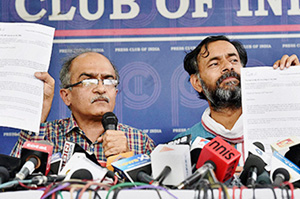New Delhi, Apr 14: A number of AAP leaders and prominent individuals today stayed away from the convention of party rebels Yogendra Yadav and Prashant Bhushan and chose to express solidarity through written statements instead.
AAP's Patiala MP Dharamvira Gandhi, who had earlier faced the leadership's ire for taking stand in favour of the dissidents, in a letter stressed the need to work towards strengthening the party's core ideals.
"The need of these challenging times is to stay true to the party's founding ideals and foundational principles and to dispassionately debate all the ideological and organisational issues to prevent the deviation of AAP which has become a symbol of alternative politics," he said.
In the letter, addressed to the volunteers, he also sought to remind them that it was their "right" to act as a watchdog over the party's decisions emphasising that they were in AAP not for any individual but for its principles.
Gandhi alleged that his effigies were burnt and a negative publicity was unleashed against him including labelling him as a "traitor".
Meanwhile, Christina Samy, another expelled National Executive member, social activists Aruna Roy, Medha Patkar, who had recently quit AAP, were also conspicuous by their absence from the Gurgaon meet.
In her message, read out by a Chennai based AAP worker, Samy said, "I am with you all in this struggle for Swaraj".
Clarifying that he is "not from and has never" been part of AAP, activist Nikhil Dey read out Roy's message.
"We will have to make sure that common man has full stake in democracy. Alternative politics should be accountable, transparent and one that responds to people," she said.
Veteran Journalist Kuldip Nayyar, also sent out a message said that "insulting" people like Bhushan and Yadav was a big mistake.





Comments
Add new comment